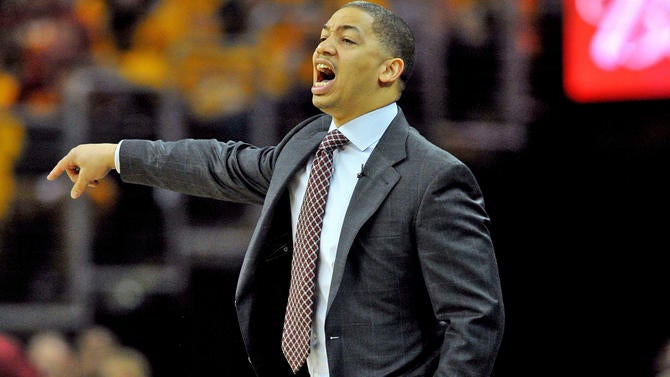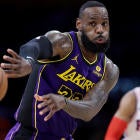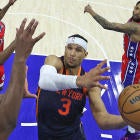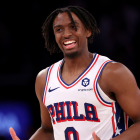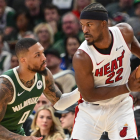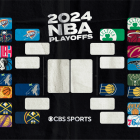CLEVELAND -- The monster that has been unleashed here in the Eastern Conference finals didn't just wake up and start stomping around when the postseason began. The seeds were planted long before.
And it happened at a time when all of us -- myself included -- were paying attention to the wrong things.
The first instinct when the Cleveland Cavaliers fired David Blatt in January despite a recent trip to the NBA Finals and an East-leading 30-11 record was, "What?" But we were focused on what the Cavs were doing, not on what they weren't doing. They were winning, but not the right way.
Not the way they were built to win.
In order to get back to the Finals -- a place where LeBron James is three wins away from appearing for the sixth consecutive time after a 115-84 obliteration of the Toronto Raptors in Game 1 of the Eastern Conference finals on Tuesday night -- they had to change.
Stylistically and behaviorally.
"We were winning," a person familiar with the team's internal dynamic told CBS Sports. "But we were a fractured team."
The Cavs were fractured and not playing to their strengths. Eastern Conference basketball with isolation and traditional lineups and riding whichever star had the hot hand would've been good enough to get the Cavs through the East again. That, however, was not the goal.
The goal of any team built the way the Cavs have been built is to win a championship. And to do that, you have to play Western Conference basketball. And you have to play with a purpose, and a pecking order that is balanced.
Before Tyronn Lue was elevated to head coach, replacing Blatt, they were playing like a team that didn't know its strengths -- or, frankly, the rules of engagement at a championship level in today's NBA.
Blatt's use of Kevin Love, refusing to get him the ball in the post and relegating him to a stand-still shooter when all else failed, bordered on ridiculous. By letting James overwhelm him in the huddle during timeouts, Blatt unwittingly ceded control -- and demoralized the rest of the team. By not being comfortable enough to rein in James, the dynamic of the team became one of LeBron and then everybody else.
"They felt they were doing this for LeBron," the person familiar with the internal workings of the team said, "instead of with LeBron."
Lue changed that the moment he first told James in a huddle, "Shut the [expletive up]. I got this," according to a person who heard the exchange -- and a few others like it. If Lue was going to get the stars and the role players to buy into the strategic changes he was determined to implement -- play faster, space the floor, move the ball, take full advantage of Love's versatility -- he was going to have to restore order first.
He did it in every way possible, starting with James -- calling him out in film sessions, barking at him in practice, seizing control back. Only then could the Cavaliers evolve into the juggernaut we are witnessing now.
Maybe that's why it took longer than some of us expected for the Cavs to realize their potential. The Cavs didn't just need a strategic makeover; they needed a psychological one, too.
It wasn't going to work at all unless, and until, someone took control and then implemented a style that matched the Cavs' personnel -- and personalities. Remember that the team's general manager, David Griffin, cut his teeth in the Western Conference with Mike D'Antoni as the coach in Phoenix. The freewheeling style that the Golden State Warriors rode to a championship over the Cavs last season -- and a record 73 victories this season -- was the essence of Griffin's frame of reference as an executive.
For his part, Lue tried to downplay the idea that the Cavs had to adopt that style to get back to the Finals and have a chance -- that they had to play more like the Warriors than the Raptors or Hawks.
"We've always played that way," Lue said Tuesday night. "This year, we're just trusting the pass more."
Translation: Trusting each other.
The result heading into Game 1 on Tuesday night was that Cleveland has attempted an average of six more 3-point shots per game than the Warriors for a postseason-high 36.3 per game. (They were only 7-for-20 Tuesday night, when James led a relentless attack on the rim.) They've made an average of nearly five more 3s per game than Golden State for a postseason high 16.8 on 46 percent shooting.
In 20 postseason games last season, the Cavs averaged 28.7 3-point attempts and shot 34 percent. Seven-footer Timofey Mozgov started all six games in the Finals; he's played 33 minutes in nine postseason games this year.
Psychologically, the transformation started with James. Strategically, it had to go through Love, who needed to have a more expansive role.
"I just think it's a belief in me and telling me to be aggressive," Love told CBS Sports on Tuesday night of his relationship with Lue. "We've really seen eye-to-eye since I've been here, and he knows what I'm capable of. Like any relationship on or off the floor, it's all about communication. And that's been always very high with Ty. We've been very honest to each other."
Like the time early in his tenure as the coach when Lue shouted at Love, "Get your [expletive] in the post. We're going to you. I don't care if you've missed 10 shots in a row. We're going to you."
"It's taken me back to playing my brand of basketball," Love said.
And it's taken the Cavs to a place where they are playing the brand of basketball that Griffin envisioned when James returned home from Miami in 2014, forming a Big Three with Love and Kyrie Irving that was never going to reach its potential until things changed.
"We understand who we are as a team," Lue said. "I think defensively and offensively, we understand who we are and who we want to play through."
At 9-0 and counting in these playoffs, now we understand why.
